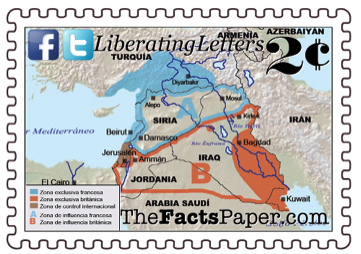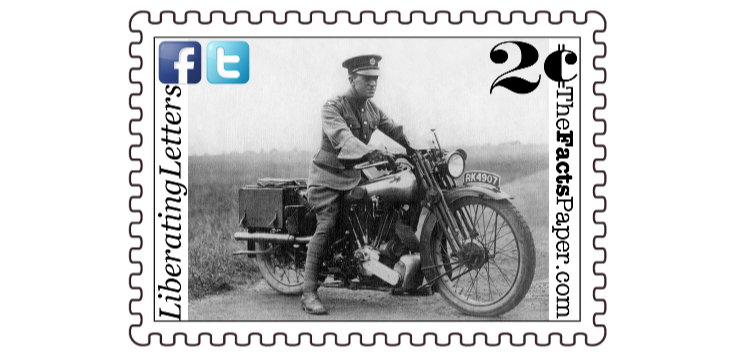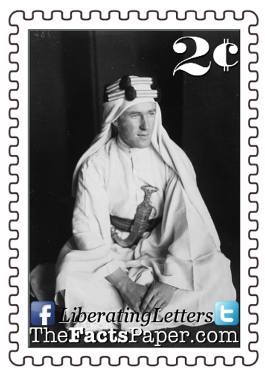This is the problem Lawrence had with the agreement. After the war, Lawrence continued in and out of the military, finally retiring in 1935 to a small cottage in Moreton, Dorsetshire. Two months later, while enjoying a ride on one of his motorcycles, Lawrence swerved to miss two boys on bicycles. He succumb to his injuries six days later, dying on the anniversary of Sykes-Picot, May 19, 1935. His death was not completely in vain as one of his neurosurgeons, Hugh Cairns, conducted a study on motorcycle head injuries after this accident. His work resulted in crash helmets for both military and civilian motorcyclists, saving thousands of lives.
Liberty, this story is another reminder that even though God institutes our governments, they should never take the place of God. We should respect the government and do our best to elect Godly people as our representatives, but we can never lose site that they are still human. Regardless of their intentions, their actions often have disastrous results. Because Abraham inserted himself in God’s promise, this letter shows how the world still today suffers from the feud between Ishmael’s descendants and Isaac’s. (see Family Feud) However, God promises to bless those whose God is the Lord (Psalm 33:12). Therefore, we should constantly pray for our leaders, requesting that their decisions and actions are made out of careful thought and consideration, and not led by selfishness, malice, or deceitfulness.
That’s my 2 cents.
Love,
Mom
May 19, 2017
Dear Liberty,
As World War I spread across Europe, countries chose sides. Britain, France, Italy and Russia formed the Allied Powers while Austria-Hungry, Bulgaria, and the Ottoman Empire (or Turkey) joined Germany in the Central Powers. Hoping to turn Arabs against their own government, British officer Thomas Edward Lawrence, otherwise known as Lawrence of Arabia, worked with Arab forces in a rebellion against the Ottoman Empire, referred to as the Great Arab Revolt. During their fight, the Arabs were promised their own land and the ability to govern themselves. However, behinds the scenes, the Allied Forces had other plans.
Lawrence studied the Crusades, the Arab culture, and its influence on British military tactics in his college years, traveling some 1,100 miles on foot in the Middle East visiting castles of the crusades. (see A Crusade For The Truth) After continuing his interest beyond his degree, the British military utilized his knowledge, placing him in intelligence as an Arab expert at the outbreak of World War I. (see The Shot That Changed The World) Arabian sheik Faisal al Husayn found an ally in Lawrence, who was well versed in Arab customs, language and traditions. The two organized a tribal revolt against the Turkish government. As toppling the Ottoman Empire would greatly benefit the Allied Forces, Lawrence was authorized to promise the Arab rebels their own independent Syrian territory with an Allied win.
THE OTTOMAN EMPIRE STRIKES BACK


Lawrence quickly blended into Faisal’s
forces, even donning Arab attire. In 1916, he was
captured by the Turkish government and held in
Deraa, where he was tortured with severe
beatings and homosexual rape. Lawrence
eventually escaped, resolved to continue fighting
even though his time in captivity forever
devastated him. Using guerrilla warfare,
Lawrence helped the Arabs greatly damage the
Turkish Government. With each success, his
influence in the Arab forces grew. In addition, he
suffered several bullet and shrapnel wounds for
the cause.
However, as traumatizing as his Turkish
captivity and torture was, nothing prepared him
for the backstabbing he was about to receive from
his own beloved British government.

In the fall of 1915, the United States continued to remain neutral. (see The Day America's Neutrality Sank) Britain and France, as leaders of the Allied Forces, chose two men to devise a plan to split up the Ottoman Empire if the Allies won. The Empire controlled a large portion of the Middle East, which included major shipping routes. So, it was agreed their territory should be divided to ensure the shipping routes remained open and Arab alliances became torn.
Britain’s Sir Mark Sykes and France's Francois Georges Picot began the task of randomly dividing up the Turkish controlled territory. No regard was given to current boarders, cultures, regional sects or ethnicities, such as the Kurds. In fact, they were purposely broken up. Russia also had aspirations for Turkish territory. For their help in the war effort, a separate 1915 secret agreement with Britain promised them Constantinople as well as the Dardanelles. In return, Britain would control other areas, including oil-rich Mesopotamia. (see Red Sunday)
Meetings began in November of 1915 and by May of 1916, the Sykes-Picot Agreement was complete. Britain and France signed it on the 16th with final acceptance on May 19, 1916. Per this secret agreement, Russia would acquire several Armenian Providences, while France took over the northern zones and Britain the southern zones of the Ottoman Empire. These zones were divided into areas directly controlled by the two countries as well as areas governed by local Arab chiefs yet under European supervision. Palestine, which contained the Holy Land of Israel, would be controlled by multiple international administrations. (see The State Of Israel)
Even though Russia was not part of the negotiations, a copy of the agreement was sent to czar Nicholas II because of their inclusion in the treaty. Yet the Allies weren’t the only ones orchestrating secret deals. Germany began making their own confidential arrangements and supporting their own beneficial revolts.
In early 1917, anticipating a United States entry into the war, Germany reached out to Mexico in efforts to find an ally against America. As a result, Congress declared war on Germany on April 6, 1917. (see The Day America’s Neutrality Sank) Closer to home, Germany helped Bolshevik Party leader Vladimir Lenin in his revolt against the Russian empire, much like Lawrence was leading against the Ottoman Empire. Except Lenin’s goal was Marxism where Lawrence’s objective was independence.
Due to the war, Russia’s economy plummeted, causing riots in March of 1917 and forcing Nicholas II to abdicate, ending centuries-long czarist rule. Out of necessity, Russia withdrew from World War I, nullifying their portion of the Skyes-Picot Agreement. However, they still had a copy of the document. (see A Dynasty's Fall)
Since Russia now had a fractured government, Germany smuggled an exiled Lenin and his Marxist commanders through their country and back to Russia. After months of political parties vying for power, the Bolsheviks gained enough support to win a majority. In November of 1917, Lenin and his party overthrew the current Provisional Government, ushering in Marxism as Soviet rule. (see Communism's Rise) Shortly thereafter, the new leaders discovered the Sykes-Picot Agreement. Wanting peace with the Central Powers, the Bolsheviks released the secret agreement to the public, embarrassing the Allies and infuriating Arabs across the Middle East.
By the fall of 1918, the American forces had turned the tide of the war. (see A Reluctant Hero) One by one, individual Central Powers started signing Armistice agreements. So when summoned by King George V, Lawrence assumed they would discuss the boarders of the new, independent Arabia. Instead, the king declared he wished to knight the brave soldier. Lawrence was not impressed. He despised the Sykes-Picot Agreement, seeing it as a betrayal against the Arabs, to whom they promised independence. Lawrence quietly declined the king’s offer, then turned and walked out of the palace.
With the end of the war (see Veterans' Day), the Allied Powers moved forward with redistributing of the Middle East. While most in the world accepts the region as it is today, some Arabs have never gotten over the betrayal. And the world has been feeling the effects ever since.
Iraq’s Erbil Province Governor, Nawzad Hadi Mawlood, explained in 2002, “Hundreds of thousands have been killed because of Sykes-Picot and all the problems it created. It changed the course of history—and nature.”
The most recent problem was the rise of the Islamic State in 2013. Generally called the Islamic State of Iraq and Syria, or ISIS, by the media, Democrat President Barack Obama correctly referred to them as ISIL, Islamic State of Iraq and the Levant. The term Levant encompasses the larger region of the former Ottoman Empire, not just the two specific countries. This is important because it reveals the objective the radical Islamists involved in the movement.
According to Caliph Abu Bakr al-Baghdadi in 2014, the leader of ISIL, “This blessed advance (through Iraq and Syria) will not stop until we hit the last nail in the coffin of the Sykes-Picot conspiracy.”
ISIL is not interested in just conquering the two countries of Iraq and Syria. They want to return to the time before Sykes-Picot, which includes the dissolution of Israel. However, despite how wrong the Sykes-Picot Agreement was, it does not sanction the massacre of non-radicalized Muslims and the desired obliteration of Israel.
Now, 100 years later, the world is forced to confront a group of radical Islamic terrorists inflicting horrible atrocities on Christians, Jews, other Muslims, and infidels because of their desire to re-dominate the region. They don’t want peace with Israel, Christians, or even Muslims who do not conform to their faction of Islam. They want their empire back and at this moment in time, after years of a U.S. Administration unwilling to properly fight and defeat them, they are stronger and ever closer to obtaining their goal. It is unfortunate, and somewhat questionable, that even with his use of proper terminology, Obama failed miserably in fighting, or even criticizing, the horrific terrorist group.
Europe divided up the Ottoman Empire, trying to dismantle and obstruct a united Arab state so as to protect their own economic and trade interests. One can argue, as the victors of World War I, they had the right to split up the conquered territory. Regardless, where they went undeniably wrong and deserve proper criticism was promising the Arab rebels their own independent Syrian state knowing full well they would never deliver on their promise.


